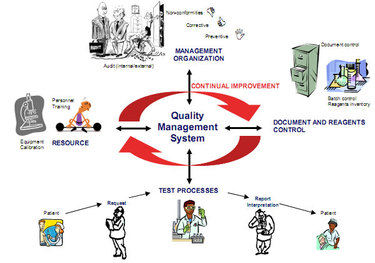|
TQM - Total Quality ManagementTotal Quality Management (TQM) movement cannot be separated from Lean Manufacturing. Demming’s photo is in the lobby of Toyota’s headquarters, bigger than the photo of founder Toyoda Sakichi. Demming didn’t find an audience in the US after WW II, because managers at the time thought that poor quality was caused by people who just didn’t want to do a good job. They didn’t think there was much managers could do to improve quality except exhort employees to do a better job. Demming’s basic message was that quality is a management responsibility, and poor quality was almost always the result of systems imposed on workers which thwarted people’s desire to do high quality work. He taught the Japanese managers how to empower production workers to investigate problems and systematically improve processes. He taught that teamwork and long term, trust-based relationships with suppliers were far better than adversarial relationships. He emphasized a culture of continuous improvement of both processes and products. In the 1980’s, Demming’s fourteen points were studied by virtually every manufacturing manager. Among these fourteen points are the well known mantra’s: Don’t Inspect Quality Inconstantly Improve the System. Break Down Barriers Between Departments. But a few of Demming’s fourteen points might seem revolutionary even today, such as: · Drive Out Fear · Eliminate Quotas · Numerical Goals and Merit Ratings · Don't Award Business Based on Price · Minimize Total Cost. The basic practices of TQM in the 1980’s might be summed up in these ten simple rules: · Eliminate Waste · Minimize Inventory · Maximize Flow · Pull From Demand · Empower Workers · Meet Customer Requirements · Do it Right the First Time · Abolish Local Optimization · Partner With Suppliers · Create a Culture of Continuous Improvement These Lean Manufacturing rules have been tested and proven over the last two decades. They have been adapted to logistics, customer service, health care, finance, and even construction. The application of the rules may change slightly from one industry to the next, but the underlying principles have stood the test of time in many sectors of the economy. Summary of W. Edwards Demming’s 14 points 1.Create consistency of purpose. 2.Adopt a win-win philosophy. 3.Don’t depend on mass inspection; build quality in. 4.Don’t award business based on price; minimize total cost; build long-term relationships of loyalty and trust with a single suppliers. 5.Constantly improve the system of production, service, planning, etc. 6.Train for skills. 7.Provide leadership: help people do a better job. 8.Drive out fear and build trust so everyone can do a better job. 9.Break down barriers between departments; abolish competition and build a win-win system of cooperation. 10.Eliminate slogans, exhortations and zero defect targets; the cause of the bulk of problems lie in the system, and are beyond the power of workers to correct. 11.Eliminate quotas, numerical goals and Management by Objectives; substitute leadership. 12.Remove barriers that rob people of joy in their work; abolish the annual rating or merit system. 13.Educate and improve individuals. 14.Involve the entire organization |


